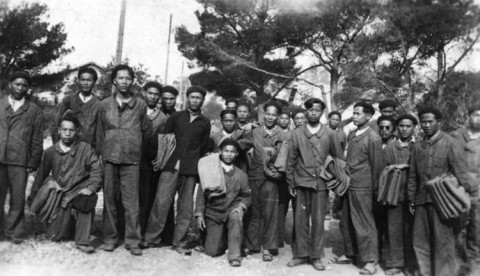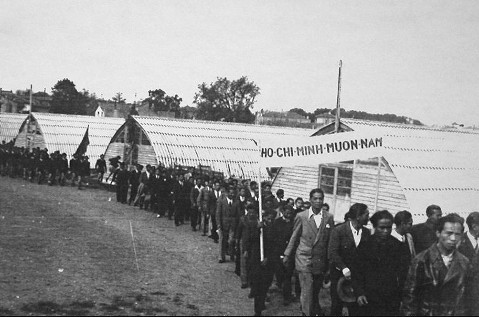Book "Indochinese workers in France": Vietnamese dignity in France
The fate of 20,000 Indochinese workers in France has been considered a “sensitive issue” in French history for the past 70 years. However, when journalist Pierre Daum’s book was published, the historical gaps were filled. The contributions of 20,000 Indochinese workers were recognized by the French government.
The book introduction workshop “Indochinese workers in France (1939-1952) - A forgotten colonial history” took place yesterday afternoon (November 26) in Hanoi. The workshop not only told stories about the dignity of Vietnamese people who had to do hard labor in France during World War II but also contained the tolerance of Vietnamese people in contemporary society.
Forgotten identities
Professor Chu Hao opened the conference: In certain historical periods and in certain contexts, historical truths are only obscured and cannot be buried. But the fate of tens of thousands of people is. And in my personal opinion, clarifying the forgotten fates of Indochinese people and their contributions to France is the greatest contribution of journalist Pierre Daun.
 |
| Image of Indochina workers in France during World War II |
Pierre Daun's book consists of 19 chapters about the fate of 20,000 Indochinese soldiers who went to France in 1939. This was the time when France declared war on Nazi Germany, so the French government needed many colonial youths to produce industrial products to serve the war for French youths in the battlefield. According to statistics, only 5% of them volunteered to go to France to work as interpreters, the remaining 95% were illiterate farmers who were forced to be recruited from the countryside. In France, they had to do hard labor and did not receive adequate wages.
The highlight of this community was in 1942, 500 people out of 20,000 Indochinese soldiers were sent to Camargue to find ways to restore the rice industry. “Previously, French rice was only for livestock, people could not eat it because of its poor quality” - Associate Professor, Doctor of History Pham Xanh shared.
In a faraway land, Vietnamese farmers used their ancestors' thousand-year-old farming methods to sow the first rice fields in the Vietnamese style on French soil. In September 1942, the first crop was successful with 800 tons of rice harvested. Using thousand-year-old agricultural techniques, in the following crops, the Vietnamese continuously improved the farming methods to suit the European climate and at the same time improved the saline soil. The output of the following years increased by 1,000 tons, 1,500 tons, respectively... From the first rice seedlings of the Vietnamese, today, Camargue has become a specialty rice growing region with high productivity, the pride of the South of France.
History has no "if" - "then"
According to Professor Chu Hao, 3 years ago, when meeting Professor Chu Hao in Vietnam, journalist Pierre shared that the image of a bare-backed farmer planting rice in the Northern Vietnamese style at a local museum was the motivation for him to decide to write the book. He said that the dignity of these oppressed but miraculously rising people urged him to bring this hidden corner of history to light.
After its publication, Pierre's book caused a great stir in the conscience of France. Many French localities held ceremonies to honor the soldier-workers. And on October 5, 2014, a state-level monument commemorating the contributions of 20,000 Vietnamese workers forced into exile during World War II was inaugurated in Camargue under the witness of a number of representatives of the French Republic and the Socialist Republic of Vietnam as a public acknowledgment by the two countries that these former workers were victims of the colonial regime.
Present at the workshop, the grandson of a former soldier shared: Although our family suffered many losses from the upheaval, we do not blame anyone. History has no “if” or “then” so we do not judge. We respect today’s France because the French Government has been fair with history in recognizing and honoring the contributions of our ancestors. We are also very proud of what our ancestors did in a foreign land.
The descendant of the Indochina soldier continued: My grandfather shared with me that during his time there, he got married and had children. So our generation's job is to go to France to find our brothers and completely close the old story.
Fight for independence on French soil
According to the organizers, although living in a foreign land, the soldier workers always turned their hearts to the Fatherland. They carried out many activities such as writing newspapers, distributing leaflets, hanging red flags with yellow stars, going on strike, demonstrating... to support the Vietnamese people's resistance war for independence and to protest against the French colonialists' re-invasion of our country. In 1946, when President Ho Chi Minh and his delegation went to France to attend the Fontainebleau conference, thousands of soldier workers held a solemn rally to welcome the leader of the nation. |
According to TT&VH







